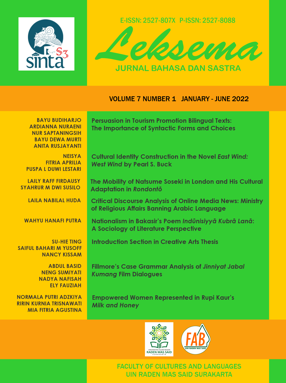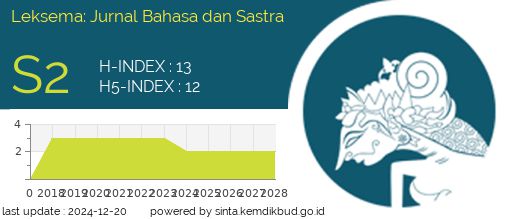FILLMORE'S CASE GRAMMAR ANALYSIS OF 'JINNIYAT JABAL KUMANG' FILM DIALOGUES
DOI:
https://doi.org/10.22515/ljbs.v7i1.5021Keywords:
case grammar, modality, proposition, ArabicAbstract
This study aimed to describe the modalities and propositions in the dialogues of the film entitled Jinniyāt Jabal Kumang based on case grammar theory from Charles J. Fillmore. This is a literary research that applied descriptive-qualitative method. The result of this study showed that from the dialogues there were found three types of time modalities, namely past, present and future; two forms of adverbial modality, i.e.: quantitative and frequency; an a negation modality. Meanwhile, the types of propositions found were the agentive, objective, source, goal, instrument, time, accompanying, benefactive, and locative cases. From the findings, it can be concluded that the case grammar analysis is applicable to Arabic sentence structure similar that of English and Indonesian language.
Downloads
References
Alfadhil, Muhammad Tegar Arief Fuady & Rahmadi. 2020. "Tata Bahasa Kasus Dalam Sosial Media Tweet Rocky Gerung Berdasarkan Perspektif Charles J. Fillmore”. In Abdul Basid (ed.). Linguistik Modern: Tata Bahasa Kasus dan Transformatif Generatif. Malang: Edulitera
Alwi, Hasan et al. 2020. Tata Bahasa Baku Bahasa Indonesia. Jakarta: Balai Pustaka
Basid, Abdul & Indah Rahmi Inayati. 2020. Linguistik Modern: Tata Bahasa Kasus dan Transformatif Generatif. Malang: Edulitera
Basid, Abdul et al. 2021. "Struktur Kalimat pada Film Knives Out Berdasarkan Perspektif Tata Bahasa Kasus Charles J. Fillmore". Diglosia 3 (4): 301-320
Chaer, Abdul. 2011. Tata Bahasa Praktis Bahasa Indonesia. Jakarta: Rineka Cipta
Collins, Peter. 2009. Modal and Quasi-modals in English. Amsterdam: Rodopi
Comrie, Bernard. 1989. Language Universals and Linguistic Typology: Syntax and Morphology (Second Edition). Chicago: The University of Chicago Press
Cook, Walter A. 1989. Case Grammar Theory. Washington, DC: Georgetown University Press
Corradi, Orlando & Matteo Corradi. 2008. The Enchanted Mountain. Pyongyang: Studio SEK (Scientific Educational Korea)
Eneste, Pamusuk. 2005. Buku Pintar Penyusunan Naskah. Jakarta: PT Gramedia Pustaka Utama
Fajri, Akhsana Azmi Nur, Selviana & Andika Putra Prasetyo. 2020. Linguistik Modern: Tata Bahasa Kasus dan Transformatif Generatif. Malang: Edulitera
Fillmore, Charles J. 1967. "The Case for Case". In 1967 Texas Symposium on Linguistic Universals
Fillmore, Charles. J. 1968. "The Case for Case". In Emmon Bach & Robert T Harms (eds.) Universals in Linguistic Theory. New York: Holt, Rinehart, and Winston
Fillmore, Charles. J. 1971. "Some Problems for Case Grammar". In Richard J. O'Brien (ed.). Monograph Series on Language and Linguistics. 24: 35-56
Halliday, MAK & Christian M. Matthiessen. 2014. An Introduction to Functional Grammar. New York: Routledge
Klein, Ewan. 1998. Grammar Frameworks. Edinburgh: Centre for Cognitive Science University of Edinburgh
Hatch, Evelyn Marcussen. 1995. Vocabulary, Semantics, and Language Education. Cambridge: Cambridge University Press
Merriam, Sharan B. 2009. Qualitative Research: A Guide to Disign an Implementation. New York: Jossey-Bass
Palmer, Frank R. 2001. Mood and Modality. Cambridge: Cambridge University Press
Samsuri. 1978. Analisis Bahasa. Jakarta: Erlangga
Sekaran, Uma & Roger Bougie. 2013. Research Method for Business: A Skill-Building Approach (6th Edition). New York: Wiley
Shull, Sarah The. 2003. Experience of Space: The Privileged Role of Spatial Prefixation in Cezch and Russian. Berlin: Otto Sagner
Sugono, Dendy. 2008. Kamus Bahasa Indonesia. Jakarta: Pusat Bahasa Departemen Pendidikan Nasional
Susiawati, Wati. 2020. Al-Jurjani versus Chomsky. Jakarta: Publica Institute
Tarigan, Henry Guntur. 2009. Pengajaran Tata Bahasa Kasus. Bandung: Angkasa
Tokan, P. Ratu Ile. 2016. Manajemen Penelitian Guru Untuk Pendidikan Bermutu. Jakarta: PT Grasindo
Verhaar, JWM. 2010. Asas-asas Linguistik Umum. Yogyakarta: Gadjah Mada University Press
Yendra. 2018. Mengenal Ilmu Bahasa. Yogyakarta: Deepublish
Downloads
Published
Issue
Section
License
Copyright (c) 2022 Leksema: Jurnal Bahasa dan Sastra

This work is licensed under a Creative Commons Attribution-NonCommercial-ShareAlike 4.0 International License.
The copyright of the received article shall be assigned to the publisher of the journal. The intended copyright includes the right to publish the article in various forms (including reprints). The journal maintains the publishing rights to published articles.
In line with the license, the authors and users (readers or other researchers) are allowed to share and adapt the material only for non-commercial purposes. In addition, the material must be given appropriate credit, provided with a link to the license, and indicated if changes were made. If authors remix, transform or build upon the material, authors must distribute their contributions under the same license as the original.







